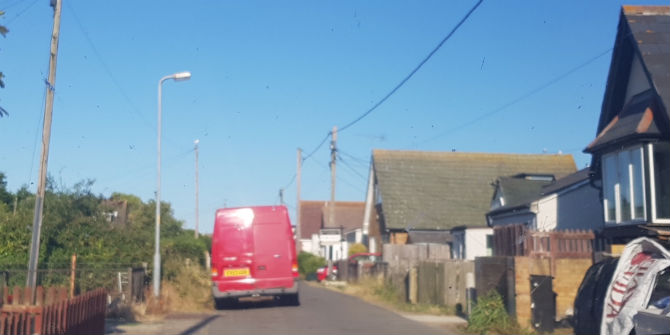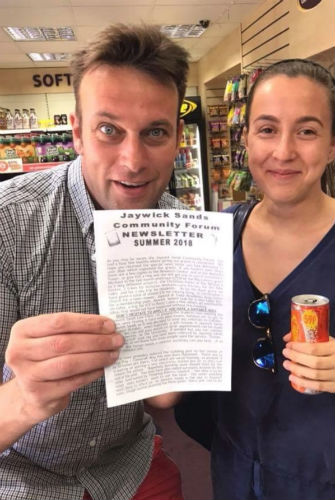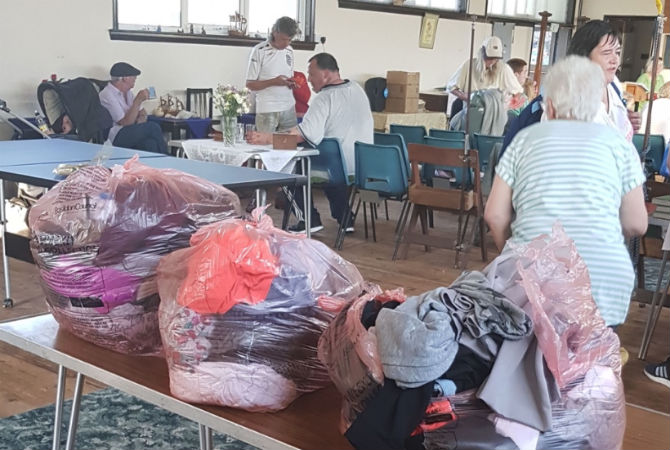 Jaywick is a Leave-supporting village in Essex, and one of the most deprived areas of the UK. Alexandra Bulat (SSEES, University of London) talked to some of the people living there about migration and Brexit.
Jaywick is a Leave-supporting village in Essex, and one of the most deprived areas of the UK. Alexandra Bulat (SSEES, University of London) talked to some of the people living there about migration and Brexit.
“We voted Leave, right? Then there is nothing else to say about Brexit!”
“What do you mean by Brexit? Can you explain in layman’s language?”
“I don’t think it will happen, it’s too late.”
“It’s poli-tricks, not politics. They just make the money disappear and nothing changes.”
“We’ve all been lied to, they don’t care about us.”

The quotes above are some of the views I recorded from passers-by near Jaywick beach when I asked them “What do you think about Brexit?”. Jaywick, a 5,000-strong community in the Clacton constituency in Essex, has been several times ranked as the most deprived area in England. Because of this, it has been the subject of much media attention, notably the TV series “Benefits by the sea”.
Over the decades Jaywick went from a successful holiday destination, especially for east Londoners, to a case study of a poor, pro-Brexit, monocultural and rough place to live in. It’s an area with a higher than average number of welfare claimants and support for UKIP and Brexit, factors which have been argued to be closely linked with the impact of austerity. This image of pro-Brexit, pro-UKIP Jaywick prompted several of my friends in London and Cambridge to advise me against even setting foot in the area. In many ways, Jaywick represents the antithesis of the places hosting universities and institutions, where research about Brexit is written.
“Jaywick? You must be joking! I would be afraid to go there in your place, especially since you speak with an accent!” said one fellow PhD student.
As a migration researcher, I have always advocated listening to, rather than just speaking about migrants. Most of my experience in research has been listening to migrants’ life stories and opinions, in trying to make sense of more complex phenomena and theories. Why should I do research any differently when writing about British attitudes towards migration in Clacton? I have always spoken in favour of having a migration debate beyond numbers and simplistic tick boxes. So how could I speak about Jaywick residents through Remain or Leave tick boxes or political party support, without listening first to what they have to say?
So there I was earlier this summer, a Romanian PhD student in Jaywick, knowing no one apart from Danny, a local whom I approached via Twitter in advance of my visit. I met Danny at the Jaywick beach bar, with the intention to interview him and then go back to Clacton-on-Sea. I soon found out that Danny knew everyone in Jaywick. During my two-day visits there, I ended up listening to a wide variety of perspectives. The fieldwork in Jaywick did not only result in insightful interview data and research notes for my ongoing PhD study. The time spent there was crucial to challenge my own assumptions and stereotypes about the people of Jaywick, views mainly influenced by remote conversations with British friends and media portrayals. I spoke to people in the pub, on the beach, in shops, on the streets, in front of houses, and during a community event.

At first sight, Jaywick reminded me of my teenage years in Romania. The beach bar where I met Danny was a déjà vu of some of my trips to the Romanian seaside: we had very little money, but a lot of fun. The pub we visited later reminded me of a village bar in rural eastern Romania, where everyone knew everyone and talked all day long in the sun, from subjects as serious as philosophy to those as practical as cooking. I observed the habit of many Jaywick residents of kissing on the cheek when greeting each other, just like we used to do in Romania. Many things were strangely familiar: the potholed narrow roads, the time which seemed to slow down while having beers and cigarettes in the local village pub at noon (as opposed to having the third coffee in a rush in London by that time) and, most of all, a strong community spirit which is perhaps increasingly difficult to find nowadays.
The views in Jaywick were not as strongly pro-Brexit as I expected. I listened to both Leave and Remain voters, but most of the people whom I spoke to were non-voters. This was one of my first observations: the high level of disengagement with politics, both at local and national level, prompted by a feeling that Jaywick residents do not have a voice in the “bigger picture”. They felt “left behind”, yet broadly unable to affect change. Later on, when I showed some leaflets from the EU referendum, almost everyone told me they have never received these campaign materials – not even the official government Remain-supporting leaflet, which was supposed to reach every household in the UK. Jaywick seemed not only left behind economically, but also left behind during the campaign. “No one knocked on my door around that time”, was the typical answer. While a couple wanted a second referendum, because they felt they have been lied to the first time, most people I spoke to just wanted politicians to “get on with Brexit”. They felt that a delay in the Brexit process means even more badly prioritised spending on negotiators, instead of funding the communities in urgent need of resources in the UK. While a few believed things will become better after Brexit, at least in the long term, the majority thought nothing will change in Jaywick – “it only gets worse around here”, as one man at the pub put it.

On immigration, again, the views were more positive than I expected. Of course, there were those who supported “kicking those [migrants] who misbehave out”, not allowing any welfare support for migrants or having zero net migration. Yet those types of views exist across the country. What surprised me in Jaywick was how some justified their positive attitudes towards migrants from poorer countries or refugees. There was a sense of empathy towards migrants from people who used to have nothing and who now have just about enough to survive, such as a woman who used to be homeless in East London with five children before arriving in Jaywick. She said, “Even if people around here tell you they are against immigrants, if you ask them, would you like if you were on a boat fearing for your life, or would you like if you had to choose which of your children to feed today, wouldn’t you look for a better life? Most understand then, because many can relate.”
There were also mixed views about people coming from inside the EU. The negative attitudes were expressed when speaking about people from Eastern Europe. Although most described East Europeans as “hard workers”, understood potential motivations of people to migrate and recognised they have seen little immigration personally in the area, they believed migration has a negative economic impact locally. This is influenced by the fact that, apart from those working in the local pubs and shops, most Jaywick residents I spoke to were retired, unemployed or working in casual, seasonal jobs. People disliked the type of low paid, insecure jobs which have been created during recent years. The opposition towards migrants “taking our jobs” was not about the shortage of available jobs, but the lack of “work that pays off” in Jaywick and the surrounding areas. There was a perception that migration allowed the creation of these low paid jobs, as opposed to an alternative scenario where, with more restricted migration, employers would be forced to create jobs that “pay off” for British people living in Jaywick.
I left Jaywick late in the evening on my second day, after speaking to those attending the Jaywick Happy Club meeting, organised by Danny. The community spirit there was genuine, with each helping others however they could: warm tea, clothes, advice, someone to speak to. “Thank you for the wonderful day,” said Danny when he dropped me off at the station, “we both learnt a lot!” As I was typing my field notes on the train back to Cambridge, I had a lot to think about.
Our “culture of speaking, rather than listening”, as sociologist Les Back describes it, often means we generalise about “elite remoaners” and “racist Brexiteers”, just because it’s easier to speak about someone, rather than seeking to listen and understand the more complex picture. Personally, as a migration researcher, I find it contradictory to listen to migrants’ stories and avoid unfair generalisations, while generalising about Brexit-supporting areas at the same time. Would we have these Brexit debates now if politicians also chose to listen more to people’s local concerns over the years?
In Jaywick, both the Brexit voter and their Polish neighbour next door have life stories to tell, stories of economic hardship, feeling forgotten and seeking a better life for themselves and their communities. For some, the answer to this “better life” was to leave Poland, for some to leave Jaywick – and for others, it was to leave the EU.
This post represents the views of the author and not those of the Brexit blog, nor the LSE.
Alexandra Bulat is a PhD Candidate at the School of Slavonic and East European Studies (SSEES), University College London (UCL). Her doctoral research focuses on how attitudes towards EU migration are shaped in the UK, based on qualitative fieldwork with British, Romanian and Polish participants living in two local authority areas – Tendring (Essex) and Newham (London). Alexandra tweets about migration and citizens’ rights @alexandrabulat.







Good to read an article that can see both viewpoints.
Thanks for a nice piece, and a contrast to the doubling down on pejorative assumptions about Brexit voters that often seems the norm . I suspect, and your article suggests, that that poorer people in the seaside towns (most of whom voted Brexit) have plenty in common with migrants seeking a better life from Romania.
Sad, really. Romanian PhD student goes to depressed town and finds that the people there are really nice What a surprise. I find that, in general, people are really nice wherever I go.
I was in Scotland when their independence referendum was being fought. And, guess what? They were all, both sides, really nice to the Englishman.
Problem is, we are all going to suffer under brexit. There is just no way the UK will prosper more from brexit than it would from staying in the EU. Jaywick’s economic problems are all a result of our successive governments’ economic policies. Brexit will just make things worse for them.
As I said, sad really. Nobody deserves what’s coming, no matter how they voted in the referendum.
I worked as a solicitor in Clacton in the early 1980s and had many clients from Jaywick – often neighbour and boundary disputes under the old green form £5 legal assistance scheme. I remember Jaywick then, over thirty years ago, much as it’s described here. High levels of deprivation, rough-and-ready but with community spirit. The only immigrant I ever met was a Spanish lady who’d lived there for years. Jaywick’s problems then had absolutely nothing to do with immigration or Europe (we’d only been in the EEC a few years). I feel enraged that people have been led by politicians and newspapers into voting for something that can only make their problems worse.
Thank you for being one of the few academics and others who spend their time making comments about the 17.4 million leavers in the country based on actually talking to them! The insults, stereotypes, and casual assumptions of racism and so on have been so numerous that I don’t even notice them now. In all my years until the referendum I was rarely insulted, since I have been insulted repeatedly by remainers. And to make it worse almost all of them earned more than me, were a higher class than me and were generally in power over me. And they felt it appropriate to strongly criticise the way I voted in a democracy, and, to do so based on their own assumptions on my reasons.
I agree with you Lee Jones. I am so angry at the way people who voted leave have been insulted.Some of the LSE should not have been published.They remind me of the bigoted false science studies of the 19th cent. One essay in particular tried to explain the vote Leave was due to lack of education and age..My family voted to Remain..
I voted to leave because i think the EU rules do little harm to big big business. London has done well through the City which favours big business.The EU is no good for small inventive businesses.which have to struggle with daft EU rules.. I thintk there will be a new energy if Brexit is not thwarted .
My family are disgusted by the rude blinkered stance of the unelected officials who are behaving like facist dictators.They would vote Leave if there were to be a next time.
The so called Popular parties are nor rising up in France because of misinformation. These people are struggling because the EU is not flexable enough to deal with the problems.of member states.
One great thing I can say about this country is, that in spite of some whatsome of these nasty LSE essays infer,there is not one UKIP/,BNP member of Parliament,Even here in Thanet, the most put down town in the SE Nigel farage did not win a seat.. We continue with our Conservative MPs . Sir Roger Gale,has fought hard for our seaside towns and against his own government’s policy of using Thanet as a dumping ground for the people London is clearing out of council housing.so the land can be sold to developers.
Sir Roger is fighting fo the Local airport of Manston now going through a DCO process. This has been a long battle so that this area of the South East will have a good chance to prosper..
I’m hoping that the Mrs Gloag’s and Brian Souter’s of this world ( Stagecoach)will no longer be able to manipulate central Government to enable than to run a private fiefdom sink estate city for the benifit of the London clearances on the land of the valuable airport.at Manston.Thanet is a place, like Jaywick with little work.and not much water..
All people everywhere want is chance to do well. It hs been a big mistake of successive governments to think that UK economy or even the Uk as one area of Europe should source its wealth on Financial services.so heavily.Look at the 2008 crash for which all are paying. .
To add to my comments I tweeted:
Its striking that many of the people you spoke to don’t vote and aren’t engaged with politics at all. If they did vote would they be ignored by local and national politicans?
1. Do they not vote because they are ignored?
2. Or are ignored because they don’t vote?
I suspect 2.
You say “almost everyone told me they have never received these campaign materials – not even the official government Remain-supporting leaflet, which was supposed to reach every household in the UK. ”
If the people are not registered to vote they will not have materials posted to them, or even delivered by hand. Was the governement leaflet sent to every household, or only to households where someone was registered to vote?
It would be interesting to see what percentage of the population Jaywick is on the electoral role.
Good article but surprising that anyone is surprised by friendly locals just because they voted leave. I’m from Crawley where most people voted leave, including Bangladeshi and Indian friends who never even go to Europe and don’t care about Europe, let alone the E.U. Don’t know a single brown person who voted remain, not one. Are they racist? Maybe it’s just a working class thing?
And our polish next door neighbour who has been here since 1960 voted leave . Like a lot of us the EU looks a bit communist to her.
So please stop the assumption of racism just because people are white and English.
I used to live with very working class part of France and they hated the EU. It is corrupt and inefficient. Now it’s looking like a bully.
Good article I hope to visit jaywick one day and I hope whatever happens either the EU or the uk give them some funding. They have been left behind and deserve better.
I refused to vote because I hate the EU I think it’s arrogsnt and I bid W in local politics but I was concerned that the conservatives would screw up the leaving process . Boy I got that right. If there was a second vote lots more people would leave the EU . Most people I know who abstained have moved towards leaving now.
LSE needs to get off its high horse
It’s all,fear to listen, as a graduate student I listened to may Occupy participants and the current resentment of Brexit is not strange to me. But the other thing I observed is that nobody had any practice possible ideas, and that modern political discourse is just consumer expression,of desire, and the any times I tried to,engage to try and help them understand basic facts about UK banking I got blank looks. My experienced in Essex confirmed this to me, Brexit was an act of identity drive vandalism driven by our cultures oppression with our own ethnicity and not a response to anything real